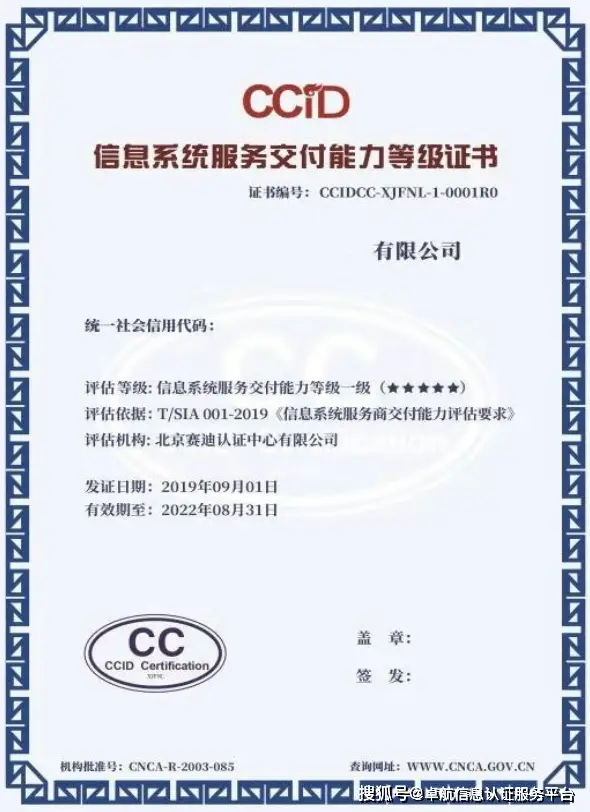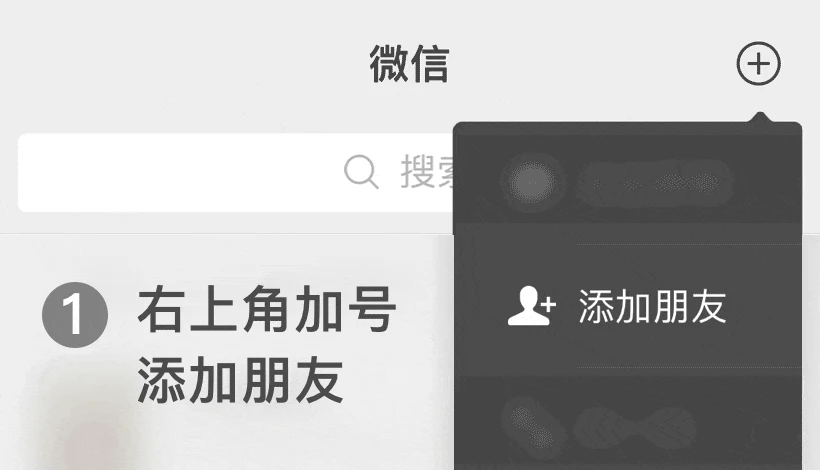
 Professional services are guaranteed
Professional services are guaranteed One on one full process guidance
One on one full process guidance Efficient and fast experience
Efficient and fast experienceCCID certification is a third-party capability assessment system led by the China Academy of Electronic Information Industry Development (directly under the Ministry of Industry and Information Technology), aimed at scientifically evaluating the full process capability of enterprise information system service delivery through standardized and graded assessment models. This certification covers multiple fields such as information technology services, system integration, software development, cloud computing, and big data services, and is suitable for IT service providers, digital transformation solution providers, and large enterprise IT departments.
Core objective:
1. Standardize industry standards: Establish a unified service capability evaluation framework to promote transparency and quantifiability of industry service quality.
2. Enhance enterprise competitiveness: Through graded certification, help enterprises identify shortcomings, optimize service processes, and enhance customer trust.
3. Promote ecological cooperation: Provide objective basis for Party A's enterprise to select suppliers and reduce cooperation risks.
CCID certification is based on the "Information Technology Service Capability Level Requirements" (GB/T 28827 series standards), combined with international advanced management models such as ITIL and CMMI, to construct an evaluation framework covering five dimensions: strategy, process, technology, personnel, and resources.
1. Strategic management
Strategic planning: matching degree between service strategy and business objectives, dynamic adjustment mechanism.
Risk management: risk identification, contingency planning, and closed-loop monitoring.
Continuous improvement: quantitative improvement goals, PDCA cycle, technological innovation capability.
2. Service delivery process
Requirement management: Requirements capture standardization, change control process.
Solution delivery: Reasonable technical solution and standardized delivery (node achievement rate ≥ 95%).
Operation and maintenance support: SLA achievement rate (such as fault response ≤ 1 hour), customer feedback loop.
Knowledge management: Knowledge base coverage and experience reuse rate ≥ 70%.
3. Technical Capability
Technological maturity: Coverage and adaptability of mainstream technologies (such as cloud computing/AI).
R&D innovation: R&D investment proportion (e.g. ≥ 5%), number of patents/software works.
Security assurance: ISO 27001 certification, proactive defense system.
4. Resource guarantee
Infrastructure: Hardware redundancy ≥ 30%, elastic scalability of cloud resources.
Tool platform: Automated tool coverage rate ≥ 80%, data analysis platform.
Supply chain: supplier admission standards, multi-source backup mechanism.
5. Personnel Capability
Team qualifications: Proportion of certified core positions (such as PMP/CISP).
Training system: Technical personnel receive at least 60 hours of annual training and have their skills quantitatively evaluated.
Service collaboration: Customer satisfaction (NPS ≥ 80%), cross departmental collaboration efficienc
(I.) Classification standards
CCID certification is an evaluation and certification of the delivery capability of information system service providers based on T/SIA 011-2019 "Assessment Requirements for Delivery Capability of Information System Service Providers". This certification is divided into four levels, with one being the highest level. The highest level represents the enterprise's strongest information system service delivery capability.
The first level is divided into 5-star, 4-star, and 3-star, with 5-star being the highest star rating.
Level 2: Higher level, representing that the enterprise has strong information system service delivery capabilities. The second level is also divided into 5-star, 4-star, and 3-star.
Level 3: Medium level, representing that the enterprise has a certain ability to deliver information system services.
Level 4: Basic level, representing that the enterprise has basic information system service delivery capabilities.
(II.) Application requirements
1. Basic application requirements
• Enterprise qualifications:
Registered enterprises in Chinese Mainland, operating for 2 years or more (Level 1 can be extended to 1 year).
There are no major violations of laws and regulations, and there have been no major information security or delivery accidents in the past two years.
• Service experience:
Complete at least 3 related field projects (1 typical case is acceptable for Level 1).
The project needs to pass customer acceptance and have complete delivery records.
• Management System:
Establish a basic service management system (such as project management system, risk control process).
2. Core application requirements for each level

(III.) Precautions
1. Principle of hierarchical application:
Enterprises need to apply step by step from the first level, and in special circumstances (such as outstanding technical strength), they can apply for cross level evaluation, but they need to submit additional proof of innovation.
2. Validity period and review:
The certification is valid for 3 years, and an annual report must be submitted and subject to random inspections; Apply for re evaluation 6 months before the expiration date.
3. Rejected item:
If material fraud, major safety accidents, or customer complaints are not properly handled, the certification qualification will be directly cancelled.
1. Enhancing industry competitiveness
By using graded certification to clarify the comprehensive capability level (L1-L5) of enterprises in the IT service field, it becomes an entry threshold or bonus point for bidding in key industries such as government, finance, and healthcare, helping enterprises break through market barriers.
2. Customer trust enhancement
Relying on the authoritative endorsement of CCID, significantly enhancing brand credibility, reducing the evaluation cost of service provider capabilities for Party A, shortening project decision-making cycles, and enhancing customer cooperation willingness.
3. Standardization of service capabilities
Through systematic evaluation and improvement, we aim to shift enterprises from experience driven to process driven, establish replicable service methodologies, reduce delivery risks, and improve SLA (Service Level Agreement) compliance rates.
4. Policies and Ecological Dividends
High level certified enterprises are given priority in being included in the government's recommended service provider list, receiving policy support such as project resource docking and tax incentives, while enhancing the priority of ecological cooperation with top manufacturers.
5. Internal efficiency optimization
The certification process drives enterprises to improve project management, technology research and development, and customer service systems, identify process bottlenecks, and establish data-driven monitoring mechanisms to achieve cost reduction, efficiency improvement, and continuous improvement.
(I.) Basic materials
1. Enterprise qualifications: Business license, organization code certificate, and audit reports for the past two years.
2. Project case:
Three or more project contracts and acceptance reports in related fields (one case can be provided at the first level).
Project delivery records (such as implementation plans, test reports).
3. Customer evaluation: Customer satisfaction survey report or written recommendation letter in the past year.
4. Management documents: basic documents such as service management system, risk control process, etc.
(II.) Grade certification materials
1. Process documentation (Level 2 and above):
Standardized service process manuals (such as "Requirements Management Specification" and "Operations SLA Agreement").
2. Proof of Technical Ability (Level 3 or above):
Copy of technology patent, software copyright certificate, and ISO certification.
3. Optimization cases (Level 4 or above):
Data driven service improvement cases (such as empirical reports of 30% efficiency improvement).
4. Innovative achievements (Level 5):
Industry standard participation certification, core technology white papers, or innovative solution cases.
(III.) Other materials
Self assessment report (explaining compliance item by item against CCID grading standards).
Core team qualification certificates (such as PMP, ITIL, CISP, etc.).
The CCID Information System Service Delivery Capability Level Certification process is divided into five core stages, aimed at systematically evaluating the service delivery capability of enterprises, as follows:





Wechat ID:Siterui888888
Add a wechat friend to get free plans and quotations


 Contact
Contact




 定制化解决方案
定制化解决方案 专业咨询指导
专业咨询指导 透明化服务
透明化服务 长期顾问式合作
长期顾问式合作